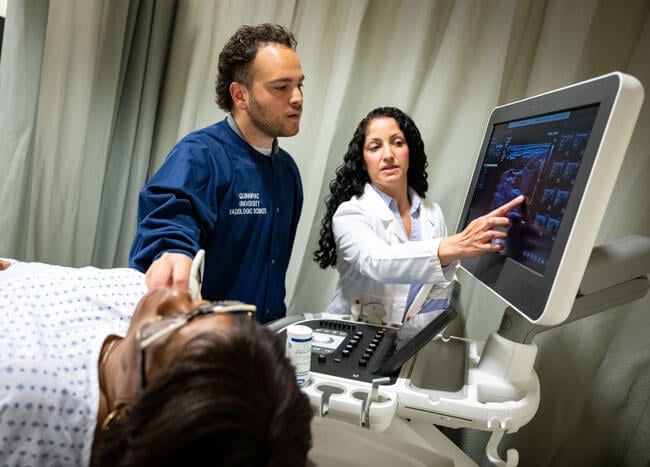
Diagnostic medical sonographers provide physicians and other health care providers with eyes and ears into a patient’s body, helping them to diagnose and treat cancer, blood clots and pregnancy complications.


Diagnostic medical sonographers provide physicians and other health care providers with eyes and ears into a patient’s body, helping them to diagnose and treat cancer, blood clots and pregnancy complications.

As a diagnostic medical sonographer, you’ll perform and interpret ultrasound scans to help physicians diagnose a range of diseases, assist surgeons with biopsies, and track the health and growth of developing fetuses. Our bachelor’s degree program, the first and only one of its kind in Connecticut, teaches you sophisticated sonographic procedures and technology, as well as the interpersonal skills necessary to work directly with patients in a range of settings. You’ll be prepared to be the eyes and ears into a patient’s body, helping physicians and other healthcare providers diagnose and treat a wide range of conditions, from cancer and blood clots to pregnancy complications.
The BS in Diagnostic Medical Sonography at Quinnipiac emphasizes both flexibility and career mobility. The program affords you opportunities for clinical training in a variety of subspecialties, including OB/GYN, breast, vascular, abdominal and musculoskeletal imaging. These options enable you to pursue multiple credentials in the field, increasing the number of jobs for which you qualify. This specialized training also provides the ideal foundation for those interested in pursuing medical school in the future.
During the professional component of the program, you’ll complete more than 1,400 hours of clinical field experience across five separate rotations. Your clinical education takes place in any of 20 affiliated locations across the state, including Diagnostic Imaging Associates, Gaylord Hospital, Whitney Medical Imaging and Southern Connecticut Vascular Center. Upon degree completion, students will be prepared to challenge numerous ARDMS certification exams.
The BS in Diagnostic Medical Sonography is a rigorous program that places specific demands on its students. As stated in the mission of the program, graduates of the program will meet the needs of the community as efficient and highly qualified professionals.
Students in the program will be required to verify their understanding and compliance with the technical standards, or their belief that with reasonable accommodations these standards can be met, through reading, signing and returning the form to the program director.
In addition students are made aware of the program’s progression policy, health requirements to attend clinical internships and fees incurred. More detailed information can be found by downloading the PDF below.
With an abundance of career-focused information and resources, the career advisers within the School of Health Sciences support students as they expand their professional networks and attract the attention of prestigious employers.
| Graduation Year | Graduation Rate |
|---|---|
| 2022 | 83.3% |
| 2021 | 85.8% |
| 2020 | 82.4% |
| 2019 | 60% |
| 2018 | 83.4% |
| Graduation Year | Pass Rate |
|---|---|
| 2022 | 100% |
| 2021 | 100% |
| 2020 | 100% |
| 2019 | 100% |
| 2018 | 100% |
| Graduation Year | Pass Rate |
|---|---|
| 2022 | 100% |
| 2021 | 100% |
| 2020 | 93% |
| 2019 | 100% |
| 2018 | 100% |
| Graduation Year | Employment Rate |
|---|---|
| 2022 | 100% |
| 2021 | 100% |
| 2020 | 100% |
| 2019 | 100% |
| 2018 | 100% |
Our undergraduate admissions counselors are here to answer any questions you may have and help you navigate the application process.